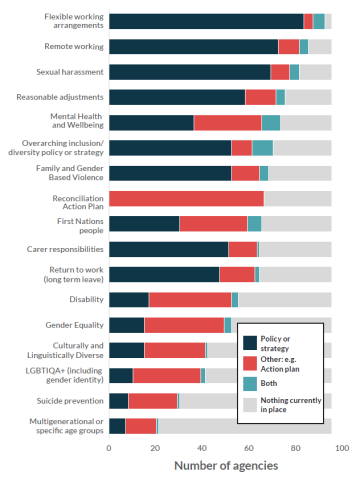Inclusive workplaces
The APS is striving to foster an APS-wide culture which integrates diversity and inclusion into how we work, and values the unique contributions and needs of every employee. Inclusive workplace culture is deeply-rooted in respect for all people and their human rights regardless of gender, age, heritage and cultural background, skills, experience, work styles and ideas.
Over 70% of employees from every measured diversity group agreed that their agency supports and actively promotes an inclusive workplace culture. This result still gives more room for improvement that agencies can strive for in the future. As discussed in Perceptions of inclusive leadership, agencies have been on an upwards trend since 2018 with the exception of 2021.

|
Inclusive workplaces must also be accessible workplaces, where every employee has the access to the infrastructure, technology, and information they need to participate fully in the workplace. Making workplaces more accessible benefits all employees, not just those that require workplace adjustments. This allows all employees to perform at their best, and can increase employee retention. |

|
Collect and share more holistic data about workplace accessibility, in order to better understand the accessibility of APS workplaces, the experiences of APS employees, and the types of accessibility initiatives agencies are implementing. |
Planning for inclusion
Strengthening inclusive workplaces requires the right systems to be in place to provide support, outline acceptable behaviours and strategically plan how to improve workplace diversity and inclusion outcomes.


In the 2021 Agency survey, agencies were asked which policies, strategies, or action plans were in place within their agency. For issues that have been an APS focus for a long time (such as Reconciliation action plans, or flexible working arrangements), most agencies have policies or strategies in place that focus on these areas. For newer focus areas, such as suicide prevention, not as many agencies have plans or policies in place.
Agencies with newer policies/strategies can share with agencies that do not have these in place yet. This can be done via the Small Agencies Forum, an article in the D&I newsletter, or creating linkages between agencies.



